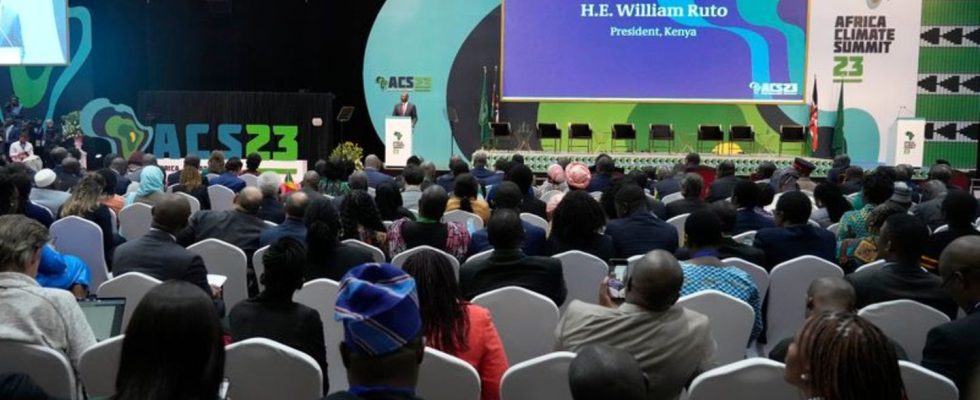Kenya
Climate summit: Africa as “key” for green global economy
Kenya’s President William Ruto wants trillions of US dollars to be invested in the continent. photo
© Khalil Senosi/AP/dpa
For the first time, a climate summit will be held with a focus on Africa. The continent is demanding finance for climate protection, but in return has something to offer for the energy transition.
Kenya’s President William Ruto has kicked off the first Africa climate summit called the continent “key to accelerating the decarbonization of the global economy”.
The energy transition is not only necessary for climate protection, but also an opportunity to create “economic opportunities worth billions”, said Ruto at the beginning of the three-day summit in the Kenyan capital Nairobi.
“Investors around the world are looking for trillions of dollars worth of green investment opportunities,” Ruto said. Africa has the potential to attract this money. This included ideal conditions for the production of renewable energies, for example from the sun and wind.
Africa also has mineral resources that are critical for the energy transition, such as lithium, copper, rare earths or silicon, and also enormous “natural capital” such as forests, arable land, water and marine resources. The aim is to develop the continent into a globally relevant “green industrial location” that enables African countries to “compete fairly” in global markets.
Africa is suffering greatly from the climate crisis
Ruto and the African Union (AU) are hosting the summit, which will bring together African leaders, as well as representatives from the United Nations, governments from other regions, NGOs and the private sector. The Parliamentary State Secretary in the Development Ministry, Bärbel Kofler (SPD), and the Commissioner for International Climate Policy at the Federal Foreign Office, Jennifer Morgan, have traveled on behalf of Germany.
The continent is suffering greatly from the consequences of the climate crisis, but contributes comparatively little to the climate-damaging greenhouse gas emissions. That is why African countries want to focus on the global financing of climate protection projects on the continent during the summit.
For the consequences of climate change that are already noticeable today, African states are demanding compensation from the industrialized countries, which have made a massive contribution to global warming. Africa, so the argument goes, is statistically responsible for less than four percent of global warming, but pays the highest price. According to estimates by the African Development Bank, climate-related natural disasters cost countries between 7 and 15 billion US dollars a year. By 2030, these losses could increase to $50 billion annually.
Industrialized countries are not keeping their promises
The summit participants in Nairobi therefore want to remind the industrialized countries of their financial obligations – for example in the financing of climate projects in the Global South. Since 2020, states have committed to raising 100 billion US dollars annually for this. The aim is to save emissions and finance projects to adapt to climate change. It has long been known that the industrialized countries have not met this goal.
Money has flowed into other areas, especially since the corona pandemic and the war of aggression in Ukraine. Demands for debt relief are also likely to play an important role at the summit.
There are now so many consecutive climate disasters that African countries are struggling to recover, said Josefa Correia Sacko, the AU’s Agriculture and Environment Commissioner. Some countries spend up to half of their gross domestic product to deal with climate-related destruction. “The costs of climate change are exploding,” Sacko warned. Industrialized countries must therefore keep their financial promises as quickly as possible.
UN climate chief Simon Stiell also emphasized the need to close the financial gap as quickly as possible. He called for the “immediate” payment of the $100 billion annually pledged, a doubling of funding for climate change adaptation, a significant increase in the Green Climate Fund to reduce carbon emissions in poor countries, and the alignment of the global financial system with “green action”. .
The summit is to end on Wednesday with a “Nairobi Declaration”, which is intended to set important signals and goals – also for the forthcoming world climate conference starting November 30 in Dubai.

